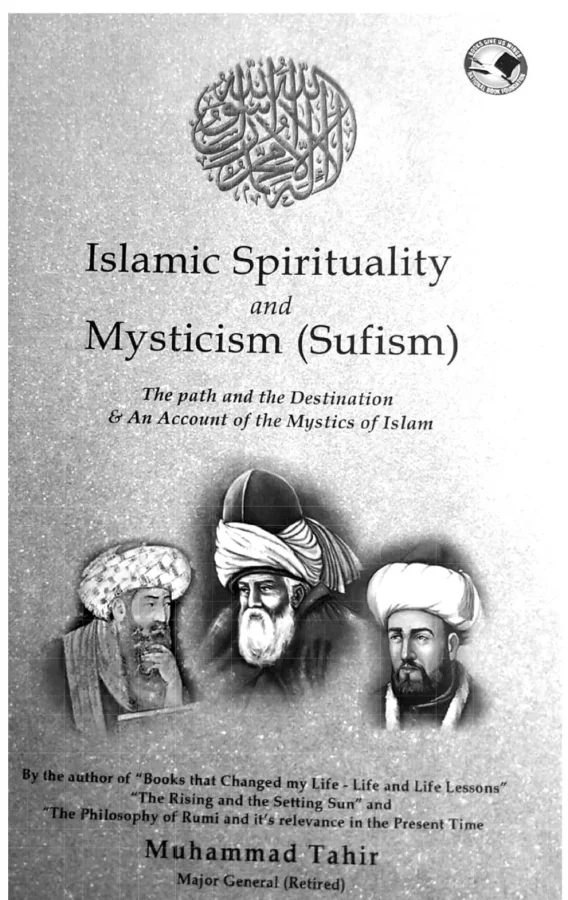THE perspective. The origin of Islamic spirituality or mysticism can be traced in the teachings of the Prophet of Islam. It can be described as inner directedness towards God to understand the soul. It is an experience, which transcends the rational theoretical concepts of philosophers, theologians, esotericism and outward knowledge of the world. The Prophet (PBUH) said, “Everything corrodes or oxidizes including the heart and the polishing of the heart is by Zikr Allah.”(Remembrance of God). The Islamic message canbe viewed from two different complementary perspectives, the exoteric and the esoteric. The exoteric interpretation is addressed to vast majority of of believers, while the esoteric is spiritual interpretation of Quran and Sunnah of Prophet and is addressed to a small mystical minority. The Sufis claim they belong to the esoteric category and the way to God is clearly the esoteric path and they are the ones, who are referred as foremost and Muqarabun (near) in the Quran. The Shahada (testimony) ‘La ilhailla Allah Muhammad ur Rasul Allah’ (There is no divinity but God and Muhammad (PBUH) is The Messenger of Allah) can be interpreted in both exoteric and esoteric terms.
Makasfat and Mamalat. Imam Ghazzali in his book ‘Ahya Alum-ud-din,’ The Revival of Religious Sciences divides the knowledge of the religion into Makasafatand Mamalat. He says Mamalat are the outwards aspects of religion, while Makasafat are things that people are not allowed to speak. He says, “These are the ineffable aspects of the teachings of the Prophet and those who deny these aspects of religion are only revealing their own ignorance.” He further says that “the inward experiences that occur in the unveiling are actually the goal and aim of the religious tradition and you are worshipping Allah Subanwa Tallah to know Allah Subanwa Tallah and this knowledge is not formal outward knowledge, but knowledge of experience and taste, what he calls Zhauq.” Hajveri says, “All Mankind is veiled from the subtlety of spiritual truth except God’s saints and His Chosen Friends and the unveiling Kashaf is given only to few. Man he says, “Remains sunk in ignorance and apathy, makes no attempt to cast off the veil that has fallen upon him. Blind to the beauty of Oneness, he turns away from God to seek the vanities of the world and allows his appetites to domineer over his reason, not withstanding that the animal soul, which Quran describes as commandeering to evil (ammarat bi la su) is greatest of all veils standing between God and man.”
Hajveri narrates the story of Haritha, who had true faith in God. The Prophet (PBUH) asked, “What is the reality of Thy faith?” Haritha replied, “I have cut off and turned myself away from the world, so that its stones and its gold, its silver and its clay are equal in my sight. I have passed my night in wakefulness and my days in thirst, until methinks I see the throne of my Lord manifest and the people of paradise visiting one another and the people of hell wrestling each other. The Prophet said, repeating the words thrice, “Thou knowest therefore persevere.”
The Icon. Rumi the 11th century saint stands as a meteor on this path. We can view him as Mount Everest surrounded by other peaks like Attar, Sinai, Al-Ghazali, Ibn-i-Arabi, RabiaBasrryee, Hafez, Imam Junaid, Hajveri and others, whose light continue to guide those, who tread on this path. Attar Tazakaratul Aulia (Memoirs of the Saints) remains the icon book of Islamic spirituality and served as inspiration even to Rumi.
The Relationship of Love with Allah Subhanwa Tallah. Attar tells the story of Zul Noon Al Misri(Egyptian). He dreams that all Human beings are collected and they hear the voice of God offering them a series of gifts. The first is, “Who here wishes to attain the sum total of all the earthly delights and pleasures.” 90 percent of them raise hands and God says,” It’s granted” They receive and leave. They hear the voice of God again, “Who here wishes to attain salvation from suffering or torments of hell fire.” 90 percent of those left raise hands and God says, “It’s granted.” Smaller crowd left, “Who here wishes to be granted my most luminous garden that no eye has ever seen and no word has ever described.” 90 percent raise their hands and God says, “It’s granted.” A handful of people still left and this time, the voice of God comes thundering, “I gave you the choice of all earthly pleasures, I gave you the choice of salvation from hell fire, I gave you the choice of my most luminous garden of paradise; you chose not, what are you here for?” These people bow their heads in humility and said, “The One who asks, knows better, we didn’t come here for pleasure, nor salvation from pain, or to attain paradise, we came for you.” This time they hear the voice of God in His soft Jamali tone, “In that case, I am yours.”
—The writer is author of various books based in Rawalpindi.
Email mhammadtahir50 @hotmail.com










